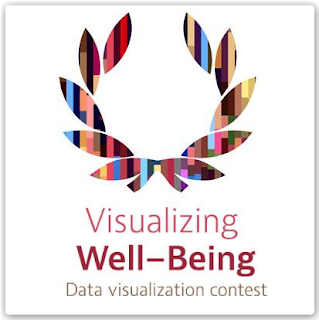We hosted a data visualization contest as part of the EC-funded Web-COSI project that ran during the summer with the deadline on August 24th. The challenge was to create a data visualization that communicated key statistics about well-being and sustainability to a broad audience. The contest was open to anyone, but there was a specific prize reserved for a winner under the age of 26. The submissions were judged on their clarity and rigour, concept, and originality.
We would like to thank everyone who entered the Wikiprogress “Visualizing Well-being” Data Viz Contest over the summer. We received so many entries of high quality and we are delighted to be announcing the winners, who will be joining us at the 5th OECD World Forum in Guadalajara next month. The contest was held as part of the Web-COSI project, which aims to improve people’s engagement with statistics beyond GDP. We particularly wanted to encourage young people to participate and offered a special prize for under 26-year olds. In the end, two of the winners were under 26 at the time of the competition and one had just turned 26!
The entries were judged with respect to clarity, concept and originality by our expert jury consisting of Kim Rees, Stefanie Posavec and Moritz Stefaner. The jury was very pleased with the diversity and inventiveness of the applications. The goal of the contest was to use creativity to communicate key statistics about well-being and sustainability to a broad audience.
To see more information about the winning entries, please head over to the winner's page on Wikiprogress.
The Winners:
Click on their names to view their full submission on Wikiprogress
Andrew Mollica
Scattered Well-Being
According to Andrew, his “visualization shows how varied well-being measures can be within a country and consequently how country-wide statistics can over-simplify. While it's convenient to characterize whole populations by talking about national averages, we are often masking a lot of important complexity. This visualization attempts to make understanding this complexity approachable by allowing users to view the overall distribution of different well-being indexes as well as let them focus on a particular area.”
Fidel Tomet
Seeking A Better Life
According to Fidel, his visualization “takes a look at what people say is most important to them in life and how this reflects in their choice for a new home. It thereby also raises the question how other aspects, like distance, language and immigration laws, affect the decision.”
Alice Feng
Access to Higher Education is Not Equal
The winners of the contest will receive a free trip to Guadalajara, Mexico to attend the OECD 5th World Forum in October. If you are interested in following the discussions at the 5th World Forum, you can watch via live webcast on the official website during 13-15 October.
A huge thank you to our judges and to all of the contestants who sent in their work. We were overwhelmed by the number of entries we received, and the standard was very high in terms of design and originality.











